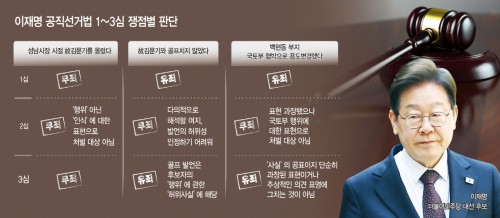 |
Legal experts are calling the Supreme Court’s recent ruling in the election law violation case of Democratic Party presidential candidate Lee Jae-myung a “flawless verdict” that corrected a critical misinterpretation of the law by the appellate court.
On May 1, the Supreme Court's full bench ruled with a strong majority—10 of the 12 justices including Chief Justice Cho Hee-dae—that the Seoul High Court’s acquittal of Lee in the second trial contained legal flaws, effectively reversing the ruling with a judgment in favor of conviction. The decision is expected to reignite debate over the role of judicial subjectivity in high-profile political trials.
Some in legal circles believe the timing of the verdict—delivered just 10 days before the official candidate registration deadline on May 11—was a deliberate effort to prevent political turmoil. By issuing the ruling before registration closes, the Court may have intended to give the Democratic Party time to consider replacing Lee as its candidate.
According to legal sources, the case reached the Supreme Court just 34 days ago and was referred to the full bench only 9 days before the ruling—a remarkably fast timeline, given that election law cases typically take around 90 days to resolve. The expedited handling is seen as highly unusual and potentially indicative of the Court’s desire to minimize disruption ahead of the June 3 presidential election.
Attorney Kang Shin-eop commented, “The Court’s unusually swift referral to the full bench and two quick hearing sessions suggest a strategic judgment to allow time for political adjustments and reduce the fallout.”
Some legal experts argue that if the judiciary has the will, the remaining stages of Lee’s trial—including the remand proceedings in the Seoul High Court and a potential second appeal to the Supreme Court—could be completed within this month. Since the Supreme Court already provided a clear rationale for the guilty verdict, legal observers say the remand court may only need one or two hearings to determine sentencing, drastically shortening the timeline.
“A new panel of judges must be assigned, but that won’t take much time,” said a lawyer based in Seocho-dong. “Since the Supreme Court has already laid out the basis for conviction, there's no need for a fresh trial from scratch. A final decision could feasibly be reached within a month.”
However, the Court is also facing criticism for not going further and issuing a final judgment with sentencing, a process known as "remanding with judgment" (파기자판). Some legal professionals argue that by clearly affirming Lee's guilt but stopping short of finalizing the penalty, the Court missed an opportunity to prevent further controversy.
Jung Joon-gil, a former prosecutor and managing partner at Haes Law Firm, said, “I hoped the Court would take a more proactive approach, but instead, they tossed the issue back into the political arena, creating new complications.” He added, “The Court failed to fully demonstrate its role to the public. This leaves room for disputes over fairness and undermines public trust at a critical moment in the presidential race.”
Most Read
-
1
-
2
-
3
-
4
-
5
-
6
-
7





















